MAPPING UNCHARTED TERRITORY
“Our family has been honored to see the legacy of my father recognized and extended through the Charles L. Branch BrainHealth Award,” said Charles Branch Jr., M.D., chair of neurosurgery at Wake Forest Baptist Health University. “We really appreciate the opportunity to participate in a perpetuation of great science that investigates how the brain works in order to unravel the mysteries of the mind.”
Behind your eyes and in between your ears lies uncharted territory. Two men of two diferent generations were both determined to map brain function – one using surgical tools and the other mathematical models. The paths of these cartographers, Professor Karl Friston, FRS, FMedSci, and Charles Branch, M.D., Sr., intersected on April 14 at the Reprogramming the Brain to Health Symposium at the Center for BrainHealth.
The late Dr. Charles Branch, Sr., was a leading research scholar, neurosurgeon and humanitarian, and his pioneering and groundbreaking work aided in creating a definitive approach to mapping brain function, alleviating the burden of epilepsy for countless individuals over the years.
In 2010, the Center for BrainHealth established the Charles L. Branch BrainHealth Award to honor Branch for his lifetime achievement. Each year at its annual scientific symposium, the Center for BrainHealth presents the award to a pioneering cognitive neuroscientist whose innovation has made a tremendous contribution to the area of brain research.
This year’s recipient, Dr. Karl Friston, who is considered the father of modern brain mapping, was honored. Dr. Friston is the Wellcome Trust Principal Research Fellow and Scientific Director of the Wellcome Trust Centre for Neuroimaging, Professor at the Institute of Neurology at University College London, and an Honorary Consultant to the United Kingdom’s National Hospital for Neurology and Neurosurgery. Dr. Friston is one of the most prominent and prolific researchers in the field of neuroimaging. He invented a technique that has been cited in research publications approximately 150,000 times.


“Understanding the complexity of the brain and exploring how brain health research can lead to individualized treatment plans is the future of the field,” said Sandra Bond Chapman, Ph.D., founder and chief director of the Center for BrainHealth. “Dr. Friston is a pioneering, futuristic thinker who has contributed immeasurably to furthering brain health discoveries.”
The 2016 Symposium highlighted neurology and advances made in computational psychiatry, an emerging field that seeks to use
neurobiological information to inform individualized therapies.
“The future of mental health will be to depart from the one-pill-fits-all era to an age of individualized care that can specifically target an underlying disorder based not only on behavior, but also neural data,” said Xiaosi Gu, Ph.D., assistant professor at The University of Texas at Dallas and head of the Computational Psychiatry Unit at the Center for BrainHealth, who helped organize this year’s event.
“Using imaging technology and advanced analysis, we will one day be able to objectively measure psychological well-being and evaluate the efectiveness of treatment and therapy,” said Gu. At the Symposium, scientists discussed how computational psychiatry is informing their research in anxiety and impaired decisionmaking, depression, addiction, schizophrenia, rehabilitation and cognitive dysfunction, and what networks are associated with thought and decision-making. The event is a collaborative efort with the Helen Wills Neuroscience Institute at The University of California, Berkeley.
Q2 | 2016 03 BrainHealth Awarded $490K for MS Research 06 Belief and the Brain in Addiction 05 Jonathan’s Story: Outrunning TBI
Karl Friston, FRS, FMedSci with Sylvia Branch, wife of the late Charles L. Branch, Sr., M.D.
Dr. Charles L. Branch, Sr.
LETTER from the Chief Director
Summer is upon us, which means you don’t need to look very far to find the latest diet and fitness tips to help you get fit. Swimsuit season gives us a reason to focus on taking care of our bodies, but what about our brain, arguably the most important part of our body?
The unfortunate truth is that most of us only stop to think about the complexity of their brain and its health when something goes wrong with it. This is something I really hope we can change. Why? Because #MyBrainHealthMatters and yours does too.
Consider that the brain is the most powerful, most staggeringly intricate electro-biochemical machine ever created. Above and behind our eyes are 100 billion neurons in a small calcium shell, laced with organic pumps, channels and switches. No one argues the fact that the brain is essential to our very being - so why gloss over what we can do to keep it sharp?
Last month we kicked of the Center for BrainHealth‘s new campaign to get to encourage others to start thinking and talking about their brain's health - how they keep it fit and go about enhancing its performance.
The majority of us have the chance to achieve better brain health each and every day.
Join us to dispel the stigma associated with brain health and highlight the multitude of things we can do each day to keep our brain healthy.
Making even small lifestyle changes like nurturing your brain with adequate sleep, physical exercise, and a healthier diet can garner a huge return. Avoiding toxic mental practices like multitasking and the comfort of status quo is crucial.
• Snap a picture with the icon provided on the back of our newsletter
• Post the photo on social media using #MyBrainHealthMatters
• Tell us how you and your family, friends and coworkers are engaging in healthy brain activities.
This is a worldwide effort because without brain health, we don’t have health.
Sandra Bond Chapman, Ph.D. Founder and Chief Director, Center for BrainHealth

BRAIN PERFOMANCE BUILDING OPENING IN ONE YEAR
The Brain Performance Institute, part of the Center for BrainHealth at The University of Texas at Dallas, delivers science-based innovations that enhance how you think, work, and live.
CONSTRUCTION UPDATE:

The building’s foundation has set, and metal beams are being installed on the site adjacent to the Center’s headquarters. The building is on track to open Spring 2017.



BRAINHEALTH AWARDED MORE THAN $490,000 TO STUDY EFFECTS OF MULTIPLE SCLEROSIS ON BRAIN BLOOD FLOW AND COGNITION
The National Multiple Sclerosis Society awarded Bart Rypma, Ph.D., associate professor at the Center for BrainHealth at The University of Texas at Dallas, more than $490,000 to investigate how changes in brain blood flow impact cognition for individuals with multiple sclerosis (MS).

Multiple sclerosis afects over 2.3 million people worldwide, and those diagnosed often complain of an overall slowing of thought,” said Dr. Bart Rypma, principal investigator who holds The Meadows Foundation Chair at The University of Texas at Dallas. “Still, very little is known
about what changes occur in the brain that cause cognitive slowing in MS. Using fMRI to examine cerebral blood flow and neural metabolic rate, we hope to pinpoint the brain systems responsible.”
As part of the study, 80 research participants will undergo structural and functional brain imaging and neuropsychological evaluation. Researchers will collect a unique set of measures never before collected in a single group of MS patients using the latest imaging techniques called calibrated functional magnetic resonance imaging and difusion kurtosis imaging.
Brain imaging will allow researchers to observe neural metabolic rate, or where oxygen is delivered within the brain, how much oxygen those cells consume, and how changes
to those factors could lead to cognitive slowing. Researchers will also assess which systems in the brain – visual, motor, or executive –most account for cognitive slowing.
The newly awarded grant will build upon Dr. Rypma’s previous research on disconnections in brain networks and the cognitive efects of MS.
“Cognitive changes afect at least one half or more of people with MS,” says Nicholas LaRocca, Ph.D., Vice President, Health Care Delivery and Policy Research for the National MS Society. “Dr. Rypma’s study explores a biological basis that may help explain these changes. This work can propel the knowledge necessary to provide everyday solutions for the cognitive problems experienced by people with MS.”
“ This work can propel the knowledge necessary to provide everyday solutions for the cognitive problems experienced by people with MS.”
-Nicholas LaRocca, Ph.D.
National MS Society
Bart Rypma, Ph.D., Center for BrainHealth principal investigator who holds The Meadows Foundation Chair at The University of Texas at Dallas.
COLLABORATIVE RESEARCH WITH RHEUMATOID ARTHRITIS PATIENTS

New study seeks to simplify medical decision-making for patients who face life-changing choices
The Center for BrainHealth is part of an eightuniversity collaboration that will investigate decision-making in patients with rheumatoid arthritis (RA), an autoimmune disease that afects the whole body. Lead investigator, Susan Blalock, M.P.H., Ph.D., at University of North Carolina at Chapel Hill, approached Center for BrainHealth founder and chief director, Sandra Bond Chapman, Ph.D., about collaborating on the study after reviewing research articles on the cognitive benefits of Strategic Memory Advanced Reasoning Training (SMART), a strategy-based brain training program developed at the Center.
The SMART program strategies target an individual’s ability to “get the essence,” or gist, from densely complex information. Through this collaborative study, researchers hope to improve medication selfmanagement among patients with rheumatoid arthritis.
“RA is a condition that can place patients at increased risk of heart and lung disease,” explained Blalock. “However, many patients are reluctant to use medications that have the potential to cause serious side efects as long as their symptoms like pain, stifness and fatigue are manageable.”
Researchers aim to determine if providing patients with clearer treatment information and strategies to evaluate that information improve their ability to manage their disease.
“We were very impressed with the increases in reasoning and judgement demonstrated by participants who completed SMART. In the new study, we will see if SMART helps RA patients make more informed decisions concerning the treatment options available to them. It is important that they understand the risks and benefits of all treatment options,” said Blalock.
Researchers will evaluate two diferent information delivery techniques: A medication guide leaflet that comes with the prescription versus a layfriendly two-page document that summarizes drug benefits and risks in the DrugFactsBox® format developed by Steven Woloshin, M.D. and Lisa Schwartz, M.D., at Dartmouth University.
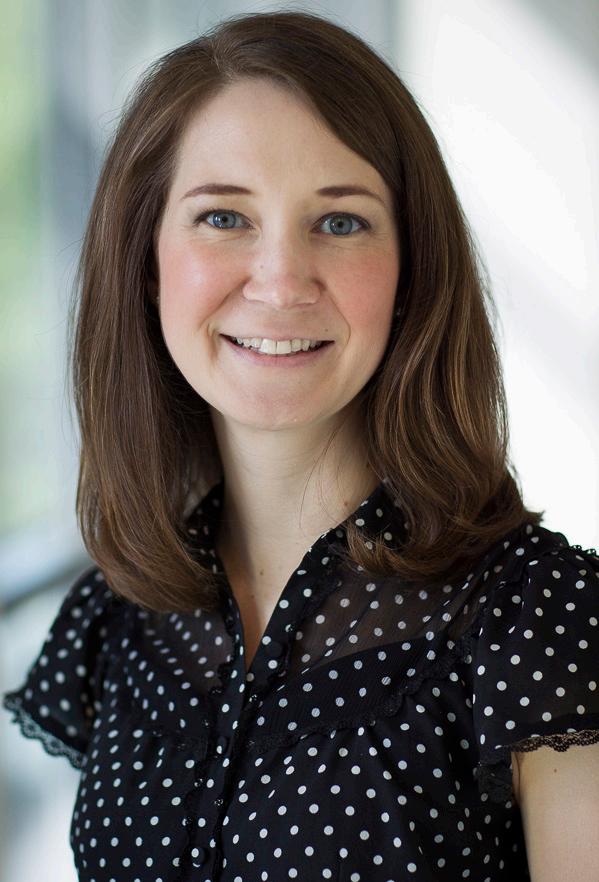
“Past studies involving SMART have shown benefits in diferent populations ranging from traumatic brain injury and financial decisionmaking to middle school student achievement and older individuals with memory complaints,” said Molly Keebler, M.S., CCC/SLP, head of community programs at the Center for BrainHealth. “We look forward to seeing to what extent SMART can help and empower individuals with RA.”
Other study collaborators include researchers from Carnegie Mellon University, Cornell University, University of Pittsburgh, UT Southwestern Medical Center, and The University of Alabama at Birmingham. The study will include 300 participants and will span three years.
This research is funded by Patient-Centered Outcomes Research Institute (PCORI) through UNC-CH.
COGNITIVE NEUROSCIENCE SOCIETY

This spring, the Cognitive Neuroscience Society held its annual meeting in New York. BrainHealth researchers joined other investigators from around the world to share the latest developments in cognitive neuroscience.
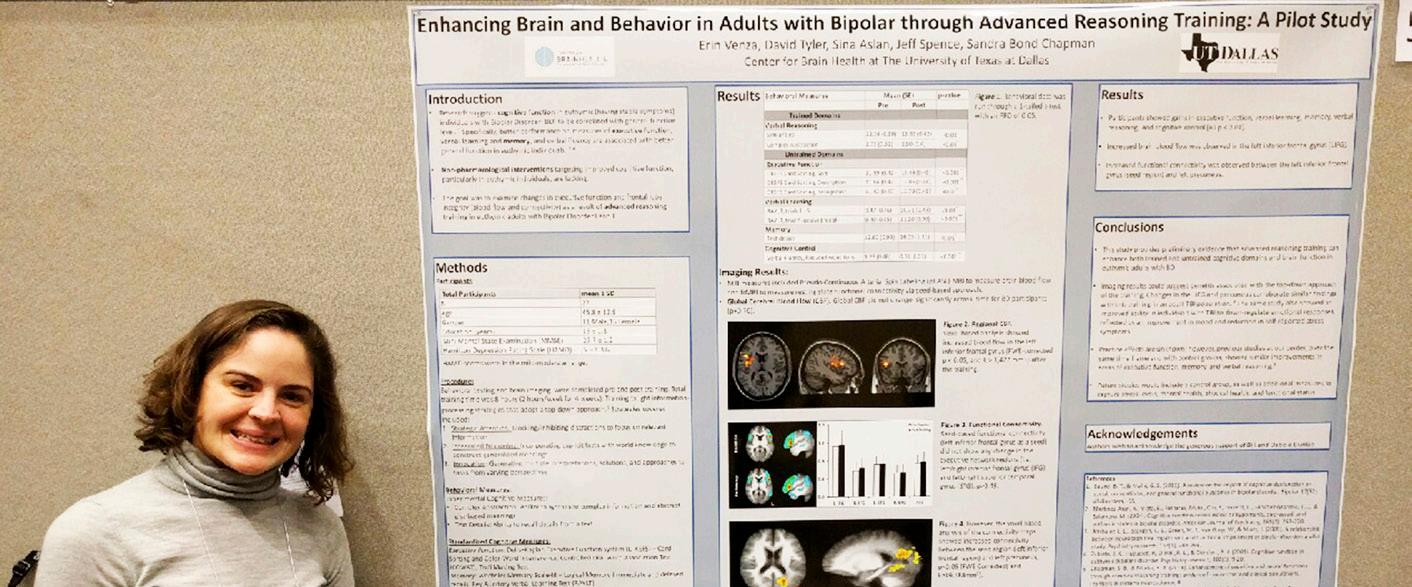
Clinician Erin Venza, M.S., CCC/ SLP presented Cognitive Changes after Reasoning Training in Individuals with Bipolar Disorder Study results provide preliminary evidence that eight hours of gist-based reasoning training can enhance cognitive performance in adults with Bipolar Disorder. Findings showed significant gains in the trained domain of abstract reasoning as well as the untrained domains of inhibition, mental flexibility, and memory.
Graduate student Justin Eroh presented Generalization Efects Following a Brief Training Session in a Virtual Environment, a study
In Memory Of JOHN
M. BORDERS
October 11, 1937 - March 30, 2016
Beloved husband to Center for BrainHealth advisory board member Pam Borders, John was an entrepreneur and one of the great broadcasters of his time. His radio gypsy days led him across the country working on air and in management for top stations in Detroit, St. Louis, Pittsburgh and Dallas (KLIF) where he was known as “Johnny Dark”. He rose from behind the mic
Collaborator Hsueh-Sheng Chiang, M.D., Ph.D., presented Common and Diferential Electrophysiological Mechanisms Underlying Semantic Object Memory Retrieval Cued by Features Presented in Diferent Stimulus Types.

“We are capable of accessing memory about objects flexibly via seeing words or pictures, and also via reading or listening to words,” explained Chiang. “We found how the brain does these jobs similarly and diferently by examining brain
Scientific posters on display, included: involving multisensory interactions within a 3-D virtual environment (VE). The goal was to provide novel stimulation to brain regions that support multiple cognitive functions and then test people on functions that were not involved in the VE training but are supported by some of the same regions that were stimulated during the VE training. Findings indicate that the VE training regimen used for the study afects neural circuits that are used to execute other complex tasks, resulting in better performance and better neural synchrony on the untrained task one day after the training.
waves recorded from the scalp. One important marker was found in alpha rhythm (8-12 Hz) that distinguishes memory mechanisms dependent on diferent types of stimulus we perceive.”
in 1973 and grew to own and operate 36 radio stations, which formed the 25th largest radio company in the U.S. He sold the stations and, in 2001, was inducted to the Texas Radio Hall of Fame and chosen Radio Ink Magazine’s “National Broadcaster of the Year”.
“Jim and I had the greatest admiration for John’s interest in all things new,” said Kay Hammond, Center for BrainHealth advisory board member and wife of Jim Hammond. “John was very curious and interested in forward-thinking people, from start-up businesses to health-related technology. He was looking forward to the completion of the new building of the new Brain Performance Institute at the Center for BrainHealth and what it will mean to those it will serve. Above all, though, his family came first.” In addition to his wife Pam of 34 years, John leaves behind four siblings, two children, and four grandchildren.
 Center for BrainHealth clinician Erin Venza, M.S., CCC/SLP, at the Cognitive Neuroscience Society annual meeting poster session.
Hsueh-Sheng Chiang, M.D., Ph.D.
Molly Keelber, M.S., CCC/SLP, Head of Community Programs, will be coordinating the study at the Center for BrainHealth.
Tandra T. Allen, M.S., Head of Virtual Training Programs at the Center for BrainHealth will be collaborating on the study.
Center for BrainHealth clinician Erin Venza, M.S., CCC/SLP, at the Cognitive Neuroscience Society annual meeting poster session.
Hsueh-Sheng Chiang, M.D., Ph.D.
Molly Keelber, M.S., CCC/SLP, Head of Community Programs, will be coordinating the study at the Center for BrainHealth.
Tandra T. Allen, M.S., Head of Virtual Training Programs at the Center for BrainHealth will be collaborating on the study.
BRAINHEALTH ALUMNI ON THE MOVE
JONATHAN’S STORY: OUTRUNNING TBI
In December 2002, Jonathan Swiatocha and his family were hit by a drunk driver. The then 10-year-old Jonathan sufered a traumatic brain injury (TBI). When the cars collided, the right side of Jonathan’s brain made impact with his skull, causing swelling and bleeding in his parietal lobes. The damage left him temporarily paralyzed on his left side. He was told that he would never be able to walk again, and several doctors gave his parents a long list of limitations he would experience for the rest of his life, including his cognitive abilities.
“He immediately took advantage of the invaluable resources at the Center, UT Dallas and UTSW and garnered the necessary information and funding to develop and perform studies of his own,” said Bart Rypma, Ph.D., associate professor at the Center for BrainHealth at UT Dallas and Meadows Foundation Chair.
This fall, Nicholas Hubbard, Ph.D., will head to the National Institutes of Health where he will be a postdoctoral fellow in the Laboratory of Neuroimaging under the guidance of Nora Volkow, M.D., Director of the National Institute on Drug Abuse (NIDA). Hubbard will join fellow Center for BrainHealth alumnus, Ehsan Shokri-Kojori, Ph.D., in Volkow's lab.
As a doctoral student and research assistant for five years in the NeuroPsychometric Research lab of Bart Rypma, Ph.D., Hubbard pioneered studies investigating cognition and neural systems in persons with depressed mood as well as authored works on brain activity in multiple sclerosis. In 2012 and 2013, he received Friends of BrainHealth awards to fund research into rumination and depression. Hubbard also received the Dianne Cash Fellowship in 2013 for his work in depression.

“Nick was a star right out of the gate,” said Rypma, associate professor at the Center for BrainHealth at UT Dallas and The Meadows Foundation Chair. “He came to us with excellent credentials and training and was champing at the bit to learn neuroimaging. He immediately took advantage of the invaluable resources at the Center, UT Dallas and UTSW and garnered the necessary information and funding to develop and perform studies of his own. As a result, Nick has gained a breadth of neuroimaging training that has equipped him with the skills necessary for a successful post-doc career, to develop his own research agenda, and to start a neuroimaging laboratory of his own one day.”
Over the last 14 years, Jonathan has focused on training his body and his brain to make physical and cognitive victories.
He began 12 days after the accident, taking his first step. He filled his days with speech, occupational and physical therapy sessions while experiencing the e fects of TBI – severe depression, anger, anxiety, loneliness, posttraumatic stress disorder and memory loss.
A year after the accident, Jonathan participated in a study at the Center for BrainHealth in which he worked with Lori Cook, Ph.D., director of pediatric brain injury programs, on strategies to improve his memory, strategic attention and bigpicture thinking. He continued to strengthen his cognitive function, participating in Strategic Memory Advanced Reasoning Training (SMART) where he learned strategies to enhance his brain performance in a small group setting and practiced brain exercises such as developing themes and
abstracting take-away messages from detailed text and images.

Jonathan says that he still struggles with the ability to remember, reason, stifle negative thoughts, and communicate clear messages on a daily basis. He acknowledges that his recovery is an ongoing process, but refuses to let this injury define him.
Now, Jonathan not only walks but has developed a passion for running. He competes in races several times a year and has a big goal in mind: To be the first Olympic runner to have a TBI.

Jonathan’s career as a professional speaker also defies his initial TBI prognosis.
“I am thankful for my ability to run, but I’m also thankful for my ability to tell others about what life is like after a brain injury,” said Jonathan. “My hope is that my TBI recovery story helps provide hope and purpose for someone else after injuring their brain.”
BRAIN TRAINING GOES TO WEST POINT

“In today’s complex and demanding world, self-regulation of attention and other cognitive processes are key to optimizing performance,” said Lieutenant Colonel Lolita Burrell, Associate Professor and Program Director of General Psychology in the Behavioral Sciences and Leadership Department at West Point. “And everyone can benefit from the skills that SMART provides.”
United States Military Academy (USMA) at West Point in New York collaborated with the Center's Brain Performance Institute to bring Strategic Memory Advanced Reasoning Training (SMART) to its campus. Center for BrainHealth clinician, Lori Cook, Ph.D., tailored the high performance brain training program to address the unique challenges and stresses that West Point students face.
“The training was designed to benefit any student who wants to prime his or her brain for academic success,” explained Dr. Cook. “The program provides tools and strategies to make studying
more efcient and contribute to a less stressful, more positive college experience.”
Two faculty and 14 freshman cadets in the Behavioral Sciences and Leadership Department’s general psychology course volunteered for the pilot program. Participants represented a diverse sample students: core squad athletes, peer tutors, and international students.
Pre- and post-test assessments will track changes in cognitive performance and selfreport data, including depression, anxiety, stress, and quality of life.
“ My hope is that my TBI recovery story helps provide hope and purpose for someone else after injuring their brain.”
Nellie Caulkins, M.S., CCC-SLP, clinical supervisor at the Center for BrainHealth and senior clinician at the Brain Performance Institute and Jonathan Swiatocha.
NICHOLAS HUBBARD, Ph.D.
BELIEF AND THE BRAIN IN ADDICTION
Xiaosi Gu, Ph.D., is associate professor at UT Dallas and head of the Computational Psychiatry Unit at the Center for BrainHealth. Her recent research received attention from top scientists and praise from the director of NIDA (National Institute on Drug Abuse), Nora Volkow, Ph.D., who said, “The report by Gu et al. in PNAS [Proceedings of the National Academy of Sciences] represents an important step forward…this work illuminates the mechanisms whereby belief can influence nonconscious learned association…”
The study, published in collaboration with scientists from across the U.S. and Europe, investigates the question: In terms of drug abuse, or substance abuse disorder, how much does belief influence the brain’s response to a neuroactive drug?
Q & A WITH XIAOSI GU, Ph.D.

Q: Why do this study?
A: If you tell people that they are getting a new efective drug, but actually give them a sugar pill, they typically show some treatment response more than 50% of the time, meaning above chance level. That’s known as the placebo efect. It's very mysterious, but explains why when you take a pill, whether or not the pill is going to work has a lot to do with whether or not you believe in it. However, it is noteworthy that our finding is related, but is NOT a placebo efect – because we found belief of “no nicotine” can tune down the efect of nicotine, when nicotine is actually present in the brain.
Q: What belief were you testing?
A: The actual belief is very simple. It’s only about whether or not there is nicotine in the cigarette. We wanted to know: Does believing whether or not there is nicotine in the cigarette change how the brain responds to the substance?
Q: Why nicotine?
A: From a tactical research perspective, nicotine, the primary addictive substance in tobacco, is a legal substance that is easily accessible and has a fairly realistic placebo in cigarette form.
Q: How did you test the brain’s response?
A: All study participants, people who had smoked at least a half a pack of cigarettes a day for the last seven years, visited the lab on four diferent occasions. Each time they underwent an fMRI scan, but each time it was under a diferent condition: They were told they were given a nicotine cigarette but received placebo; They were told they were given a placebo but received a nicotine cigarette; They were told they were given a nicotine cigarette and received nicotine; They were told they were given a placebo and received placebo.
Our study looked at the brain’s reward processing system. Using functional magnetic resonance (fMRI) imaging, we can indirectly measure dopamine, the neurotransmitter in the brain’s reward system that regulates emotion, motivation and that nice, satisfying feeling related to natural rewards like food, sex, music or money.
Q: What were you expecting to see in the brain?
A: We expected the reward system to light up with dopamine when the study participants smoked nicotine cigarettes, regardless of their belief.
Q: What did you find?
A: Even if they were smoking a real cigarette but they believed that it did not contain nicotine, their reward system did not respond.
It’s a very unexpected result. We did not anticipate belief would have this strong of an efect. We expected the nicotine group to show some reward response in the imaging data despite how they believed, but very surprisingly we did not see anything at all.
Q: Are these findings controversial?
A: These findings drastically contrast with conventional neuroscience ideas about nicotine that focus on the molecular level and show the advantage of studying human participants. We were able to see a ‘top down’ efect that could never be modeled with rodents. We were able to study very high-level and abstract computational systems because we could ask people what they thought, and we could manipulate what they thought. This approach ofers important ecological validity, because we know that in drug addiction these abstract beliefs play a very important role.
Q: What’s the take-away message?
A: These results suggest that for drugs to have an efect on you, you also need to believe that they are going to have an efect.
SYMPOSIUM DINNER
On the eve of the 10th annual Reprogramming the Brain to Health Symposium, Center for BrainHealth supporters dined with guest speakers and BrainHealth’s lead scientists at the home library of Kathy and Harlan Crow. The larger-than-life-size statues of historical figures on the Crow grounds and numerous significant U.S. artifacts provided a thoughtprovoking backdrop for a reunion of computational psychiatry pioneers and conversations between the expert scientists and some of Dallas’ top community leaders and philanthropists.
The symposium dinner also celebrated the Dr. Charles L. Branch BrainHealth Award 2016 recipient, Karl Friston, FRS, FMedSci. Representing the award’s namesake, Dr. Branch, Sr.’s beloved widow, Sylvia Branch, of San Antonio was joined by three of their five children— son Dr. Charles Branch, Jr., or Charlie; son Alfred Branch with his wife, Judy, their son, Lee, and Lee’s wife, Cassie; and son, Hon. Dan Branch, with wife, Stacey, their son, Daniel, and Daniel’s wife, Heather.


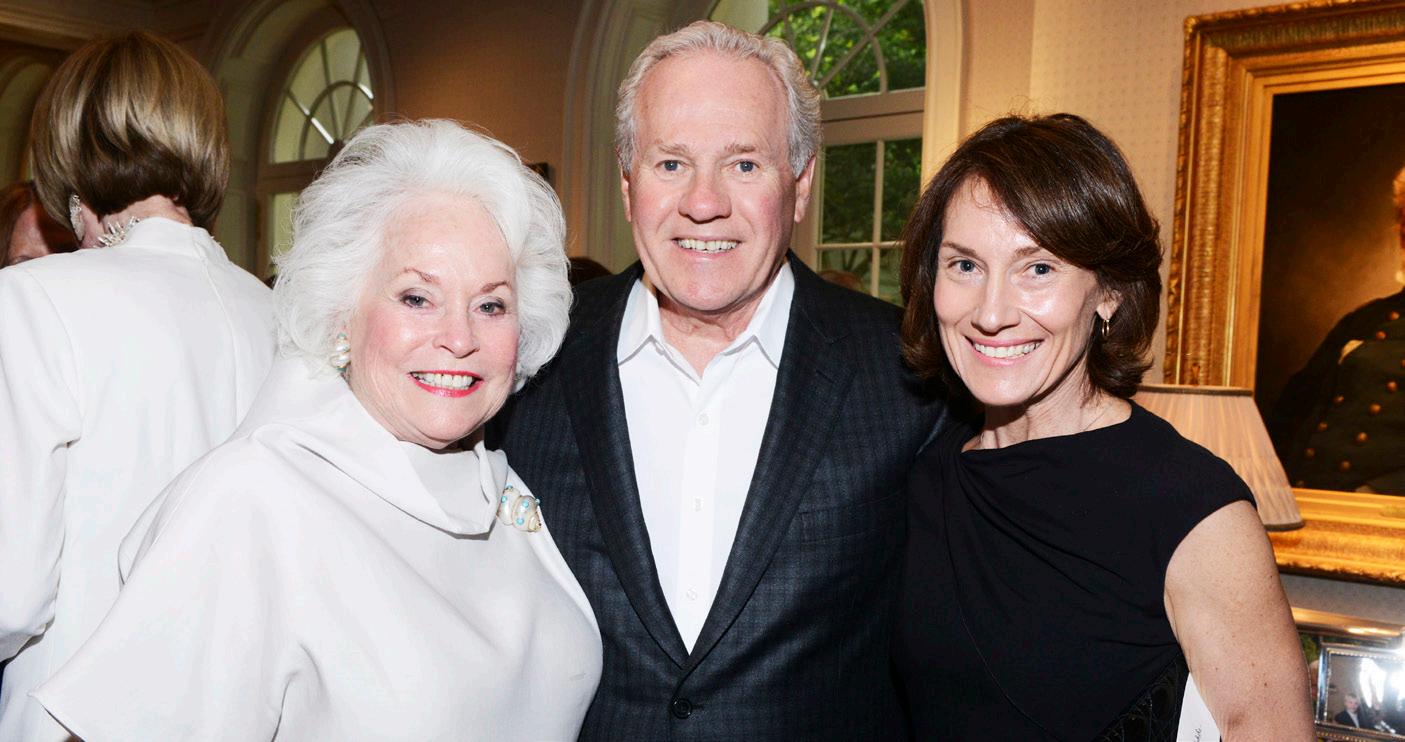
 Dr. Hobson Wildenthal, Dr. Sandi Chapman, Laura and Tom Leppert
Debbie and Jim Francis Trisha Wilson and Jeb Terry Diane and Scott Sealy with daughter Amy Rohde
Dr. Xiaosi Gu
Dr. Hobson Wildenthal, Dr. Sandi Chapman, Laura and Tom Leppert
Debbie and Jim Francis Trisha Wilson and Jeb Terry Diane and Scott Sealy with daughter Amy Rohde
Dr. Xiaosi Gu
SEEN & HEARD
2016 SYMPOSIUM SPEAKERS
The Center for BrainHealth at The University of Texas at Dallas and its partners at the Helen Wills Neuroscience Institute at The University of California, Berkeley, presented the 10th annual Reprogramming the Brain to Health Symposium on April 14, 2016. Professor Karl Friston, FRS, FMedSci, gave the keynote address and received the 2016 Dr. Charles L. Branch BrainHealth Award (see the cover story). Approximately 250 scientists, clinicians and professionals
Connecting Neurotransmitter Fluctuations to Cognition in Health and Disease
Professor, Virginia Tech Carilion Research Institute and Department of Physics Virginia Tech
Professor, Wellcome Trust Centre for Neuroimaging University College London
Dr. Montague explained the benefits of directly recording the activity of dopamine via surgically-implanted electrodes in awake human patients. Dopamine is a neurotransmitter important for many aspects of our behavior such as learning and motor functions, but its concentration in the brain had never been directly recorded in humans. Thus, Dr. Montague’s work is an evolutionary breakthrough for neuroscience, since dopamine is also implicated in many disorders such as Parkinson’s.
Anxiety and Impaired Decision-Making
Under Uncertainty: A Computational Account
Assistant Professor, Department of Psychology and Helen Wills Neuroscience Institute

University of California, Berkeley Senior Research Fellow, FMRIB University of Oxford
Dr. Bishop’s recent research indicates that the more anxious someone is, the less likely they are to take risks. People with higher anxiety tend to want more information than non-anxious people before making a decision.
The Modular Brain: Implications for the Understanding and Rehabilitation of Cognitive Dysfunction
Professor of Neuroscience and Psychology
Director, Henry H. Wheeler Jr. Brain Imaging Center

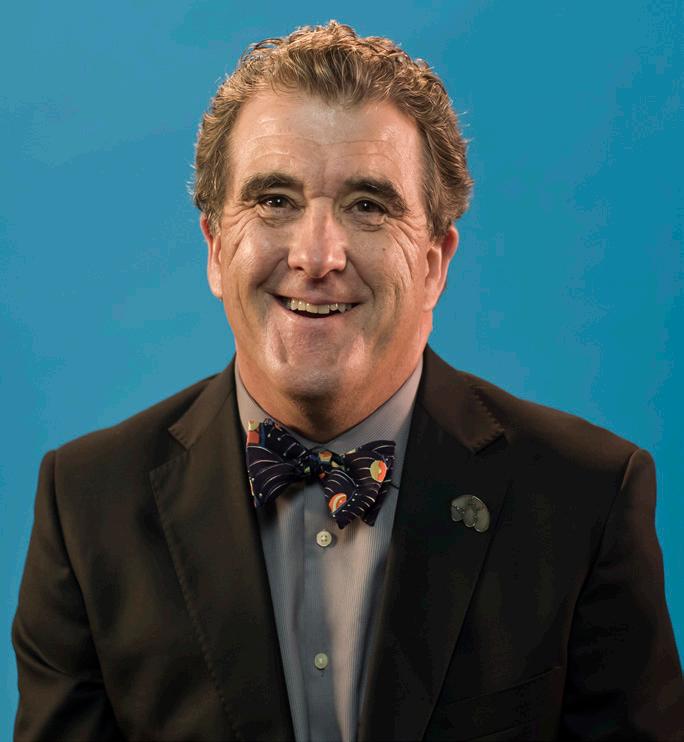
University of California, Berkeley
The brain is a modular system made up of independent and self-contained units that can be used to construct a more complex structure. The modular brain has advantages, allowing for both segregation and integration of function. This can accelerate the emergence of a complex system from a simple system by allowing one module at a time to adapt without risking loss of function in another. Specific functions can be performed without perturbing the entire system, nor does damage or injury jeopardize the entire system. Dr. D'Esposito posits that gaining a better understanding of the brain’s organization in healthy individuals will help us better understand brain change in unhealthy individuals.
interested in the emerging field of computational neuroscience attended. 34 people participated in the poster submission; the top five student posters were awarded $500 prizes by popular vote. BrainHealth’s Nicholas Hubbard, Ph.D., and Ju-Chi Yu were among the awardees.
Read on for take-away messages from the symposium’s distinguished speakers.
Meta-Connectomics: Meta-Analytic Approaches to Modeling Structural and Functional Networks
Professor, The University of Texas, San Antonio
Director, Research Imaging Institute
The University of Texas Health Science Center at San Antonio, TX
Human neuroimaging data is cost prohibitive and timeconsuming, making it very difcult to collect. To remedy this challenge, researchers from all over the world are contributing imaging data to large databases so that it can be shared with other scientists. Dr. Fox believes this metaanalyses of human neuroimaging data stands at the forefront of computational neurobiology.
Decision-Theoretic Depression
Professor, Director, Gatsby Computational Neuroscience Unit University College London
There are many aspects of diseases and syndromes, etc.
that are present in healthy individuals and may help us to cope with our environments. It is when these aspects begin to spiral out of control that we see the disorder become dysfunctional. These atypical behaviors may become self-perpetuating and afect the way we interact with others, and most specifically, our ability to make decisions.
Microcircuits, Macrocircuits, and Working Memory Impairment in Schizophrenia: Insights from NMDA Receptor Antagonist Efects
Robert L. McNeil, Jr. Professor of Translational Research and Professor of Neurobiology, Yale School of Medicine

Chief of Psychiatry, Yale-New Haven Hospital

Director, Clinical Neuroscience

Division, VA National Center for PTSD
Director, VA Alcohol Research Center
Medical Director, Schizophrenia
Biological Research Center, DVA
Dr. Krystal discussed working-memory impairment in schizophrenia and illustrated a prediction involving novel therapeutics, such as ketamine, that would treat synaptic signaling changes inherent to an emerging model of the disorder being decoded by computational psychology approaches.
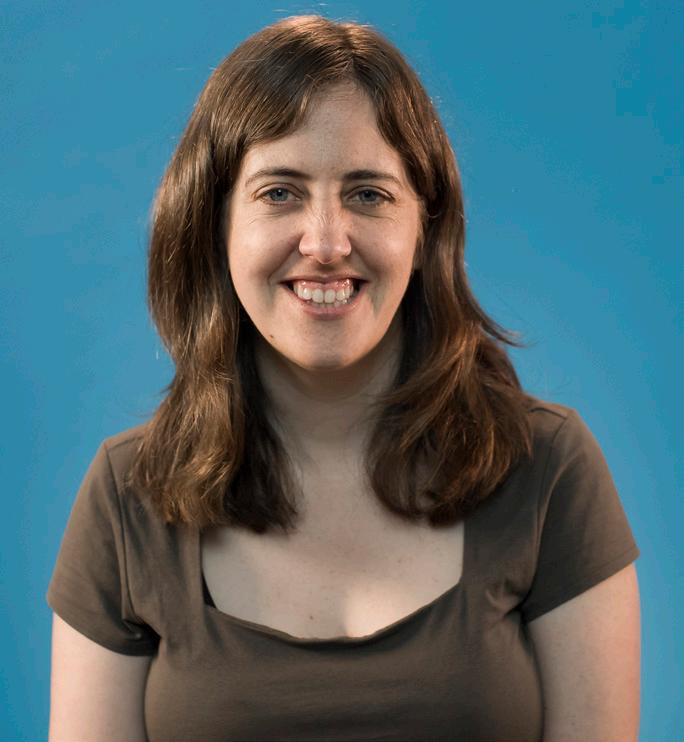 SONIA BISHOP, Ph.D.
READ MONTAGUE, Ph.D.
PETER FOX, M.D.
JOHN KRYSTAL, M.D.
MARK D’ESPOSITO, M.D.
PETER DAYAN, Ph.D.
SONIA BISHOP, Ph.D.
READ MONTAGUE, Ph.D.
PETER FOX, M.D.
JOHN KRYSTAL, M.D.
MARK D’ESPOSITO, M.D.
PETER DAYAN, Ph.D.
JOIN OUR SOCIAL MEDIA CAMPAIGN

1 2 3
Raise awareness about the importance of keeping your brain health in mind at every age.
Snap a picture with the icon to the right.

Post the photo on social media using #MyBrainHealthMatters, tag us and at least one friend, and join the movement on Facebook, Twitter and Instagram.
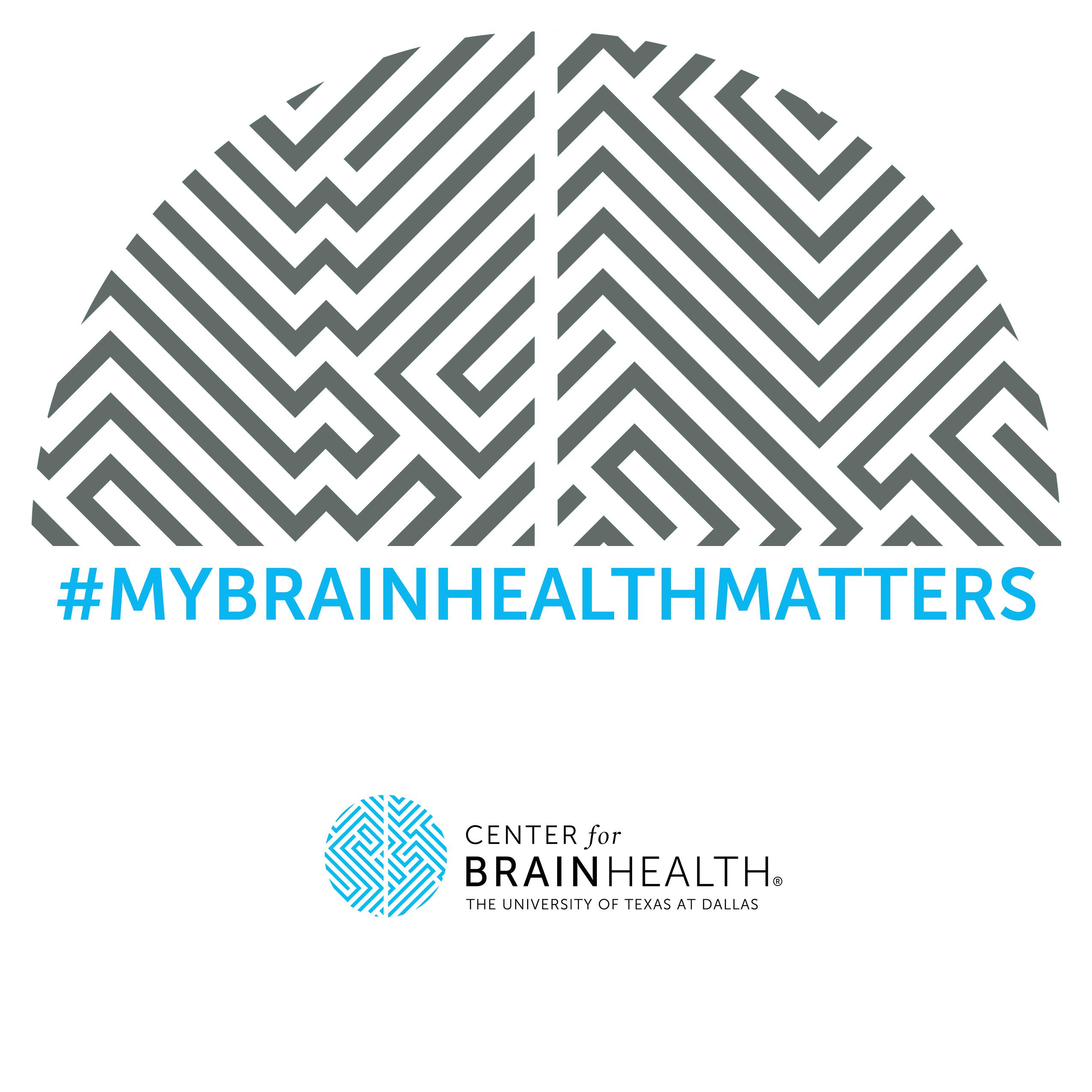
• Mapping Uncharted Territory
$490K for MS Research
• BrainHealth Awarded
• Medical Decision-Making in Rheumatoid Arthritis
• Jonathan’s Story: Outrunning TBI
• Belief and the Brain in Addiction
2200 West
75235 INSIDE THIS EDITION OF BRAIN MATTERS
Mockingbird Lane Dallas, TX














 Center for BrainHealth clinician Erin Venza, M.S., CCC/SLP, at the Cognitive Neuroscience Society annual meeting poster session.
Hsueh-Sheng Chiang, M.D., Ph.D.
Molly Keelber, M.S., CCC/SLP, Head of Community Programs, will be coordinating the study at the Center for BrainHealth.
Tandra T. Allen, M.S., Head of Virtual Training Programs at the Center for BrainHealth will be collaborating on the study.
Center for BrainHealth clinician Erin Venza, M.S., CCC/SLP, at the Cognitive Neuroscience Society annual meeting poster session.
Hsueh-Sheng Chiang, M.D., Ph.D.
Molly Keelber, M.S., CCC/SLP, Head of Community Programs, will be coordinating the study at the Center for BrainHealth.
Tandra T. Allen, M.S., Head of Virtual Training Programs at the Center for BrainHealth will be collaborating on the study.








 Dr. Hobson Wildenthal, Dr. Sandi Chapman, Laura and Tom Leppert
Debbie and Jim Francis Trisha Wilson and Jeb Terry Diane and Scott Sealy with daughter Amy Rohde
Dr. Xiaosi Gu
Dr. Hobson Wildenthal, Dr. Sandi Chapman, Laura and Tom Leppert
Debbie and Jim Francis Trisha Wilson and Jeb Terry Diane and Scott Sealy with daughter Amy Rohde
Dr. Xiaosi Gu






 SONIA BISHOP, Ph.D.
READ MONTAGUE, Ph.D.
PETER FOX, M.D.
JOHN KRYSTAL, M.D.
MARK D’ESPOSITO, M.D.
PETER DAYAN, Ph.D.
SONIA BISHOP, Ph.D.
READ MONTAGUE, Ph.D.
PETER FOX, M.D.
JOHN KRYSTAL, M.D.
MARK D’ESPOSITO, M.D.
PETER DAYAN, Ph.D.


